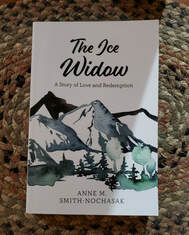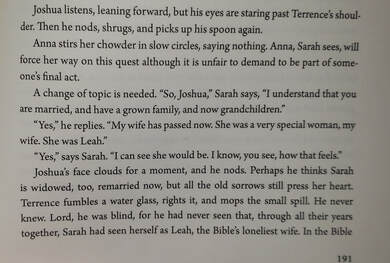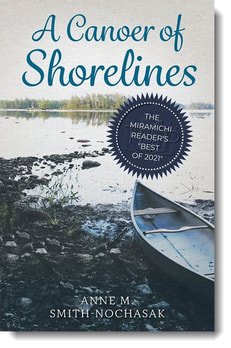AuthorAnne M. Smith-Nochasak: Archives
July 2024
Categories |
Back to Blog
Leah: Steady Flame2/3/2023 Leah, in the novel The Ice Widow, is the rival that Anna would like to forget. She is also the subtle character that we tend to overlook. She is in the background: a quiet and seemingly passionless being. She was Joshua's girlfriend, the one he did marry, wasn't she? She died, didn't she? We are sad about that, but after all, this is Anna's story, so we let Leah slip away and we move on.
Yet, some have told me that they really felt for Leah. Why does this "minor character" move us? Why did Joshua marry Leah, when Anna Caine was clearly more exciting? Ah! Leah was expecting his child! Technically, so was Anna, but no one knew that at the wedding, did they? I do wonder sometimes -- Would Joshua still have married Leah? I like to think so. I like to think that he always knew, as he did in the end, that "her peacefulness was worth more than any passion with Anna Caine." Leah was a steady flame, a low fire burning long and bright, a woman of quiet strength, loyalty, and integrity. When she did confront Anna, she gently reminded her that real love is not the passion of a season, but an inner strength that builds the good in others, a power that does not break hearts. Leah raised her children and opened her heart to Anna's son. She brought dignity and honour to the last years of Joshua's grandmother. She was gentle, but she was powerful. Leah is the "worthy wife" of the Book of Proverbs who does all things with wisdom and grace, but is not a pushover. At the same time, as her daughter Miriam sensed, Leah was often in the background as Joshua contemplated the mystery of Anna Caine. Anna was like the great mountains of the North, a raw spiritual power that challenged him. Do you see the dark, dominant mountains on the cover of The Ice Widow? Those are Anna's mountains. Leah's mountains are the gentler mountains, the mountains of home. Anna draws him away; Leah grounds him in life. The name "Leah" honours her strength. In the Biblical story, Jacob falls in love with Rachel, and happily works seven years for her father to earn her hand in marriage. We imagine his joy on the wedding day, as his beloved Rachel, heavily veiled, is led into his presence. A happy wedding night follows. Then comes the morning, and then comes the line that many have chuckled over: "And in the morning, it was Leah." Jacob storms off to his father-in-law, demanding an explanation. It seems that Leah, as the eldest, is supposed to be married first, but another seven years of work and Rachel is guaranteed. Leah, receiving the promises meant for Rachel, feeling the caresses meant for Rachel, and then abandoned on the marriage bed meant for Rachel, must have been humiliated and hurt. Yes, they were disciplined and obedient in those days, I know, but still the story of Leah has always brought tears to my eyes. I am glad that Joshua recognized his Leah's worth, grieved for her, and loved her. Even though he sometimes still thought of Anna Caine. Sarah, in the passage in the photo, recognized this, for her husband, Terrence, was still working through his own past with Anna. "All our wives," Terrence reflects, "seem to be Leah to Anna Caine's Rachel." Leah was not simply eliminated to serve the story of Anna and Joshua. No, for she remained present in every moment going forward. I grieved for her passing, and as I write, her quiet strength, her grace and compassion, are with me. Let us cherish those who are Leah, and celebrate them in our lives. In life, there are no minor characters.
0 Comments
Read More
Back to Blog
Ice Windows1/25/2023  This is Anne's first blog of 2023, the one about ice widows and windows, hopes, dreams, and happy endings. The Ice Widow is a story about incompatible youthful love that finds a new and surprising fulfillment in maturity.
The Ice Widow began as a typo: A good friend texted me about the ice window he set in his snow house wall. Only he wrote “widow.” The images raised by “putting an ice widow in a snow house wall” evolved. That fall, while waiting in a hotel room in St. John’s, I picked up my Tablet and Anna’s prologue began to take shape. The story hangs on one word: “wi’dow.” To Joshua, it is window, a simple structure that brings light and joy to the occupants of a snow house. To Anna, it is widow, a metaphor for her life: Rigid and unbending, she has carried love “like a dead coal, never allowing its light or its heat.” This is really Anna’s story, but I want the reader to know too the integrity and honour of Joshua, the wisdom of Deborah and Reah, the humility of Leah, the compassion of Terrence. Above all, I want people to hope as Mattie hopes. Until they rise, as Anna rises. I witnessed both great pain and remarkable beauty during my teaching journey, and the incidents of Anna’s career are shaped from my impressions and memories. In Mattie, for example, I grieve for every tragic moment, but I also include her triumph, for I have met many heroes in my career. Medical escort duty can be humbling. I wanted to honour those who are dying and those who support them. As the dying one stumbles through Hell, in all their bewilderment, pain, and anger, the escort is charged to walk with them, affirming their nobility and dignity. I wanted a story about this, too. A Canoer of Shorelines is the story of my heart; The Ice Widow is the story of my soul. It is, most of all, a love story with a joyful ending – for I believe all the characters deserve the riches of joy.
Back to Blog
To the People of Home10/19/2022 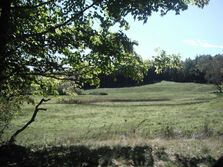 "I want to raise them up in benediction, for there is a divine spark in each human moment to be blessed. These are real people I lift up, people who may have gossiped and hated, but have also dreamed and loved. They carry you in their hearts, whether they understand you or not." Rachel Hardy, in A Canoer of Shorelines I grew up in a small rural community, and yes, we fit the stereotype for curiosity. At the same time, we always have each other's back.
Rachel, in A Canoer of Shorelines, learns through her journal reflections the intimacy and love that define a small community; her counterpart Julie, in the present, is in the process of learning this. Julie, in the novel, is suspicious of everyone in her new surroundings, imagining that they are slowing down as they pass, evaluating her past, present, and future failures. She dreads leaving the staffroom, sure that the moment the door closes behind her, they will be analyzing her failings. She "knows" that the neighbours will race for the phone to let her landlord know that she has set his lawnmower on fire. The truth is, people are interested: I wonder how she'll manage that big place; will she want help? Does she know the long history of that place? Now she'll remember to check the chaff around the engine; no harm done at least. The judgments are generated in the mind of Julie. Those of us from small communities are used to the infrastructure. During my travels, a member of an isolated community commented that whenever they saw me out walking, they appreciated the way I waved to everyone. Well, if I went walking along the roads of home and didn't wave, people would probably stop and ask if everything was all right. People care about you, so you wave, and let them know all is good. Do we watch one another? Definitely! Once, I stopped to visit a friend, and a sudden rain came on. I closed my car door and sprinted the few metres to her door. By the time I reached my friend's kitchen, someone was phoning to tell her that the person in her driveway had left their windows down. I will take that attention any day and thanks! And then there was the time that I arrived for Christmas, having been unable to do so for years. As my son and I strung lights around the front verandah, a car paused at the end of the driveway. Then the horn was blowing, lights were flicked on and off, and the car moved on. And I felt the joy of knowing that my homecoming was seen and blessed. A special time involved the installation of the security system. After the installation, I went to town, and returned to discover the alarm had gone off repeatedly. An elder and veteran from World War II had started his car and driven up, fearing that the place was burning. "You should not put yourself in danger like that," I told him. "That is a burglar alarm, and what if you had been hurt?" "Not much danger of that!" he replied. "Everyone else was already there!" Are we curious? Definitely! But it is not an idle curiosity; it is the curiosity of community that looks after its own. The people of home have guarded my going up and my coming down. They are the ones who know all my story and love me anyway. Yes, I have a little fun sometimes when I write, but anyone who reads it all knows that they are everything to me. Home can be a physical place or a place tucked deep in the heart. Home is the people who guard your memories. I cannot describe how moved I was when people of home stepped up to support my writing journey with A Canoer of Shorelines. I tell my stories by fiction, but they are rooted in the world that has been with me from the beginning. And I have discovered that people far away share that world. They have their Meadowbrooks, their Lailas, their aunts like Rachel's aunts. My next book, The Ice Widow, takes place far from Meadowbrook, and is again fiction. I have tried to work out some things, and fiction is the way I do it. Some day, though, maybe I will gather the stories that have made me smile all my life, gentle stories of truth and warmth, the precious stories that define my people of home. Blessings, my friends.
Back to Blog
Acadian Grandmothers Vs. the Plague10/5/2022 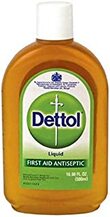 My Acadian grandmother did not mess around while polio raged through her world; she prayed fervently and washed every surface, especially the doorknobs, with Dettol. In my mind I see that little figure marching down the road, one fist raising her rosary beads high, the other brandishing a bottle of Dettol and a cleaning rag. 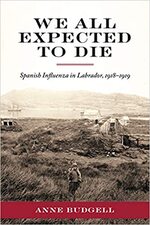 In this ramble, I am not writing to promote my books; I mention them only to lead into my topic, which concerns our relationship with vaccines and illness. I mention my books only to point out that, for better or for worse, I seem unable to escape the topic. My first novel, A Canoer of Shorelines, was drafted long before the current pandemic came into our lives. Editing during the pandemic was an emotional experience, for the characters seemed so innocent, not shadowed by the dark events of our times. Even their grief seemed uncluttered and gentle. My upcoming novel was drafted during this pandemic, and makes references to pandemics past, present, and to come. It is driven by love, not by vaccination hesitancy or pandemic mandates, although the mandates will be the catalyst to a most interesting winter. It is officially autumn, and I have received my fall dose of the Covid vaccine, which will provide protection against the newer variants featuring letters and numbers that make me think of the additional exit ramps. Exit 1A lies between Exits 1 and 2, 1B lies between A1 and 2, so a new exit between 1A and 1B would be....1Ai?) Anyway, I have a good level of protection. Which brings us to polio. As a child of the fifties, I was part of the first generation to receive the polio vaccine. Vaccine and booster time at school was exciting. The arm would throb for days, and we would do our best to get it in our dominant arm, so we could get out of school work. Alas, in those times that would result in a conversation along these lines: Child (whimpering): I can't write. My arm hurts too bad. Parent: Didn't you tell them you were left-handed and needed it in your right arm??? Child: N-n-nooo? Parent: Well, it serves you right then. Fill the wood box and get to your homework. A variation on the conclusion might include: That will take your mind off your arm. Perhaps some of you will remember the aftermath of the booster -- being punched in the booster site by the playground bully. Or, classmates lining up to punch the booster site. If you got through that without flinching, you got real playground cred! You displayed your throbbing arm with a smile. Until homework time! Those were different times. Our parents were not mean; they expected good decisions from us. Since they had grown up with polio, they were grateful for any intervention. I recall my mother saying how her family always dreaded summer, for that was the season of polio. Her mother, my dear Acadian grandmother, raised eight children through many summers when polio was all around them. At one point, they even moved from their community to escape the worst infection. My Acadian grandmother did not mess around while polio raged through her world; she prayed fervently and washed every surface, especially the doorknobs, with Dettol. In my mind I see that little figure marching down the road, one fist raising her rosary beads high, the other brandishing a bottle of Dettol and cleaning rag. My Acadian grandmother would have brought the current pandemic to heel without batting an eye. When the vaccines began, no one challenged or questioned. Many children had been lost, and survivors suffered with effects for the rest of their lives. There was loss of mobility. There were heart conditions. The vaccines meant the worst of shadows had been lifted. My Acadian grandmother continued to pray her rosary and scrub the doorknobs anyway. There was more than one disease out there, after all. Just before the pandemic, I read Anne Budgell's We All Expected to Die on the impact of pandemics, focusing on the Spanish flu, on the coast of Labrador. The stories of the survivors are horrific; the abandonment and the hopelessness endured shake the soul. When pandemics arise, their stories are a warning for the present. Illness and our coping strategies might be the defining characteristic at this point in time. That does not mean that joy is past. My Acadian grandmother did not just wipe down pump handles and doorknobs; she made delicious rappie pie and raised her children with laughter. I see her with her rosary and Dettol bottle, yes, but most of all I remember her smile. As the throbbing in my fall dose arm receded (possibly from the exercise of sawing small trees), I heard on the news that, due to extended power outages during the hurricane, a number of vaccines in storage were now invalidated. I guess some of us will be getting a letter, advising us we have to line up and roll up again. I guess we will have an especially sore arm to display on the playground. I will roll up, if I get the letter, but most of all, I will carry my Acadian grandmother's lessons always in my heart.
Back to Blog
 Musko, the great black dog, is Julie's mentor and friend in my first novel, A Canoer of Shorelines. His legacy lives on in my upcoming novel, The Ice Widow, in the husky Petra. Dogs take on subtle leadership roles in my writing because that is what they do in my life. Today, I share with you a few lessons I have learned in the companionship of good dogs. This is an amateur's viewpoint; for care and management advice, please consult a reputable professional trainer. Lesson One: Flat Snakes Do Not Rise from the Dead.
Walking along the back roads on a summer evening, we often discover snakes that have stretched out on the warm gravel and met their end when a vehicle rolled over them. The first time the golden Shay discovered one, she touched it with her nose, nuzzled the body end to end, then stood head down, unmoving. She was mourning, not investigating. Then came the day that she leaned forward to show her respects for a sleek, round-bodied snake. She sprang back as it darted away, and then she stared at the snake-less spot. She hovered hopefully over the next snake, a flattened one, and stepped back, waiting. It took surprisingly very little time for her to recognize that, although she mourned all snakes equally, not all snakes would rise to her call. Lesson Two: Border Collies Will Entertain Themselves If You Are Not Vigilant. Recently, a Border collie joined our family. Since the golden Shay is part Border collie, I had an inkling of what lay ahead. Now, everyone knows that Border collies are very intelligent, high energy dogs with a strongly developed herding instinct. Unfortunately, many do not realize that the dog does not always develop strong rapport with a less intelligent, lower energy human who regards them as adorable. At this point, I caution all potential Border collie enthusiasts to seek professional guidance from a reputable trainer -- these ramblings are strictly amateur observations! First, do not talk soothing nonsense in the hopes of calming them. They require intelligent conversation. However, although they have a well-developed vocabulary, their skill with verbs is still limited. "We will go on a car ride tomorrow, not now" translates "Mumble, mumble, CAR RIDE mumble NOW!" "Be good, stop your pulling" translates "Mumble GOOD mumble PULLING!" and they will pull harder. Second, these are working dogs. When you go to the clothesline, take multiple trips with small loads. They will guide and guard you for each. When you go for a ramble in the woods, accept that you cannot wander with your head in the clouds. Involve them -- call them back to the trail, send them ahead and direct them somewhere. Never assume they will trot serenely at your side. They crave interaction. The other day, I came out of a daydream and called Flo in -- but she did not hear me. She did not hear me because, since I was entertaining myself, she had decided to cut back through the woods at an angle to her favourite swimming place, then cross country over to the clear-cut where we hunted berries together before. I pieced this together from the drenched and muddied coat festooned with brambles when we were finally reunited. I could have lost her to coyotes that day. She could have become entrapped in brambles. I received a second chance, and now our walks are shared experiences, every minute. Lesson Three: The Last Walk Is a Forever Walk. In January, my beloved husky began to age. In late March, she suddenly manifested seizure activity. A month later, she died, an aggressive cancer claiming her. On her last morning, we walked our favourite woods walk to the fork in the logging road, where she would usually choose the direction. This day, she walked at my side, sometimes glancing at me. "This is our walk," her eyes told me, "and always will be." At the fork in the logging road, she lay down and gazed at the pines sloping down to the swamp. I just stood there, present with her, the Shay dog huddled behind her, eyes bleak. When the time was fulfilled, my lady rose, and we turned homeward. That evening, we buried her physical remains under a great pine tree in the woodlot. Her spirit is free in the world of spirit. And every day, when I walk, I walk for her. I live on, as richly in each moment as I can, for her. ____________________________ * * * ____________________________ These are but three of the lessons I have learned from dogs. If I recorded all the lessons, as John says about the life of Jesus, "Even the world itself could not contain all the books that should be written..." (John 21:25b).
Back to Blog
I Am the Canoe7/24/2022 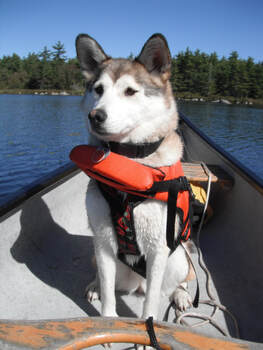 Earlier this month, a person I met at the Lunenburg Craft and Food Festival suggested that I write from the point of view of the canoe. I loved the idea. This blog is an attempt in that direction, and if blogs can be dedicated to people, it is dedicated to the person who inspired me. I AM THE CANOE
The heat presses my body, powders the finish on my gunwales, Crowds my thoughts as I yearn to recall The rush of water dancing over me. I am the canoe. I do not see. I feel. That gust of cooler air, That shudder beneath my side – That is cabin door opening, Her feet on floorboards. I am the canoe. I do not hear. I feel. I roll to touch the softness, the dryness, My side numb from the long coma of winter – That is carpet, then porch. Now my belly glides over the slick and the cool – That is ferns, meaning rocks are coming. The sharpest gouges my skin, deep, And I cringe for I am the canoe and I feel. I feel the rock edge drag deep Then the cool ease of mud Soothing And now! Now I float! Water caresses my flanks, Welcomes me, Eager, too, for our run. Water splashes into my body, And that softness is her foot that touches me, And that scratchy softness is dog. Welcome, Dog. We will ride together, Swim together. That rush of water against my side is paddle. Oh! Welcome, paddle. You complete me, my friend. We surge into the lake and that dip of shadow, That moment of cool, That is Eagle, passing above. Welcome, Eagle, Thank you for your blessing. Sun sears my gunwales but Water brushes my belly and my sides, Cool, fresh. I glide. Waves part before me and now, A touch of roughness taps my gunwale in passing Now softness, fur-ness, at my side. That is Dog joining me in the water, And now we swim together once more. And the long winter of waiting is past, And the summer of rippling water is with us. I am the canoe. I do not speak, but I sing. I feel. I am the canoe and I love this season, When I lie in the shade, cool mud beneath me, Dog often pressing wetness of nose in the evening, Coming to the lake because Dog is friend. And she is friend, Sharing lake moments, Sheltering me from storm. Do not go, please, let us explore always but Oh! That dryness fluttering over me. That is leaf falling. Our season is passing. I am on my side, pressed to carpet. Thick air pressing my thoughts, no cool of wind or water. I sink into autumn, into winter, comatose but images still darting in my mind. I am the canoe. I do not see. I do not hear, or taste, or scent, But I touch. I feel. A press of hand, a moment of paw, A paddle pushing water along my flank, Waves parting for my bow, These are flashes in memory now. I dream of her. I dream of Dog. I dream of Eagle, hovering over me. I miss, oh, I miss them all. Memories and yearnings crowd around me, For I am the canoe, And I feel. How I feel.
Back to Blog
Wasaya Times: the Dogs of Canoer6/30/2022 Developing the novel A Canoer of Shorelines has been a special part of my life. Like the Wasaya setting, it will always be part of me. This will be a visual blog, a journey into times past but ever present, to the haunting beauty of the land, blessed by the presence of good dogs. Dogs, as I have written before, are a gift from the Creator to teach us how to become better people. They are spiritual beings, who inspire love of creation and a deep and abiding joy. To experience joy as a dog does is a gift that dog persons will understand. In gratitude to the three dogs who inspired Rachel's dogs in Canoer, to my last Wasaya dog (my Lady of Wasaya), and to the Golden one who guards their memory with me.
Back to Blog
No Gentle Apocalypses6/24/2022 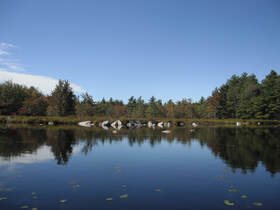 Today I want to write about joy, but I also have gloomy thoughts. This seems a perfect time to write about worlds ending and worlds emerging. Worlds end with harshness and violence, and that compels me to live in joy this moment. I en-joy the beauty around me if I live it fully in my heart this day, and carry it with me as my future joy. This morning I walked in the rain through a green world beaded with moisture and enveloped in mist. Dampness cooled my face; my hat and jacket softened and clung to me. Nearby, a thrush sang to the morning, and in the woodland, the mourning doves called to one another. It was a morning like many others here.
Elsewhere in the world, an infant frets to the sound of artillery. Children are being born in shelters underground, children who have never heard the thrush or felt the morning damp on their faces or breathed the pungent fragrance of a forest day. I am saddened by that thought, yet relieved that I am not there. They do not have that choice. It is easy to speak of kingdoms coming, of worlds ending and new orders being born, when our pocket of the world is still beautiful. It is easy to hope for a bright future when our own is comfortable. I believe that the hardest day for me will be the day that I look out over my precious green world and see that it, too, is a smoking rubble, when I see the waters clogged with debris, the sky oily and low, the tender woodland scorched and scarred. On that day will I be intoning "Thy Kingdom come" , or will I join in the great existential howl of humanity "My god, my god, why have you abandoned me?" It is easy to have faith, when birds are still singing. It is easy to anticipate the joy of seeing a new child enter the world, but we must remember that labouring for that child is agony. As a student of Christian eschatology, I would do well to remember that Jesus' last words in some records were that existential cry: "My god, my god, why have you abandoned me?" Nowhere does it say that Jesus recanted, and although we explain the question away as words uttered in the name of fulfilling scriptures, it echoes in my mind as a very honest despair. In that instant, Jesus is fully human, fully alone. God, too, is alone in that moment. I believe in God, often, as the One Who Will Fix Things. I choose not to see the agony of a God who must watch his creation twisting and mutating in terrible ways, works of beauty cast down and trampled. God is alone in that moment, and so embraces and accepts my aloneness. When my world crashes down as the worlds of so many already have, when all that is beautiful and fresh crumples, when I no longer remember my name or my story, when the darkness is absolute, I will matter. I will matter, and one day, the voice of the thrush will ring in every heart. I have hope, and I have these days to fuel that hope for me, and for everyone. I must take care to en-joy, to infuse each moment with joy.
Back to Blog
A Year of Special Moments4/25/2022
On April 27th, 2021, I came home to learn that I was now a self-published author. In an earlier blog, Self-publishing Unfiltered , I described the fun and frustration of the first two months of my publication journey. I was interviewed by Lighthouse NOW, and my book went smoothly to consignment. Life was gentle and simple.
The next ten months were, at times, like navigating a canoe through class five waters with a cracked paddle. It was less simple, less gentle. The journey is measured in moments, not sales. I learned to enjoy the summer markets. Fellow vendors shared their strength. I had incredible suggestions and encouragement from authors. It was hard to hear that a few well-chosen questions would work better than my wordy displays, but I also knew they were right. I rushed home and reworked my display – and next afternoon heard such good things. Barb, wherever you are, THANK YOU. You freed my marketing spirit! The Miramichi Reader stepped forward with a positive review and ongoing support. South Branch Scribbler later provided an interview. There were such joyful moments. In between, there came illness, cancellations, and explanations. With recovery came quick bookings and the discovery that Canoer had caught the Christmas current, for consignment copies will surely sell if you really need them. I scrounged copies from friends to fill out the display, while FriesenPress negotiated the labyrinth of supply chains in pandemic times. I do not think they anticipated me when they developed a sound marketing plan. Five days later, two boxes of books appeared by the front door, the dog again claiming the credit. I think that FriesenPress must have connections at the North Pole, or an equivalent mythic location. That got me through to Christmas, my friends got books back, and then I vanished for surgery and a winter of recovery, useful for finishing my work in progress. Now I have a stable internet connection, and am learning that there is a strong writing support network out there. Others also struggle with lack of time for writing or marketing or outlining or self-publishing vs. traditional publishing. Reaching out was hard at first. As an adult, when I invited old friends to visit, my mother would worry that they would plunder the attic of its dusty relics if she stepped out. That mindset is hard to break. So far, no one in the Writing Community has attempted to abscond with the silverware, real or virtual! They share their ideas and cheer you on. People leave my booth to borrow the book from the local library, or drop by to tell me they read their nephew’s or their neighbour’s copy. That excites me. I visit local bookstores, and am each time moved to see my dream on display. I correspond with people and share ideas. I read. I write. My life has grown richer. Although my sales statistics are possibly the lowest on record, people are reading my book, using our old high school code: the one who buys the book must share it with the rest of the class. I am participating in conversations. I am writing. I am content. After all, Laila’s theme in A Canoer of Shorelines is: The measure of success is a satisfied mind. My one regret is that my lady, the brindled Husky who saw A Canoer of Shorelines into reality and into marketing and saw my second draft to completion, passed away four days before Canoer’s anniversary. I write for her. I go forward for her. I breathe the gentle air of the lakeshore for her. Such a year, my friend.
Back to Blog
Perfect Morning, Bright and Shining4/13/2022  “I don’t know where she is, or what she’s doin’, or why,” Joe breaks in, “but she were at the lake last May. Up by th’ Narrows, in that ol’ canoe, workin’ along with that big white dog runnin’ the shore beside her. ‘This is a secret, Joe,’ she says. ‘I’m not supposed to be here.’” …… “I know what I saw,” Joe insists. “Were a bright and perfect May mornin’, and there she is all bright and smilin’ and that big white dog runnin’ along the sho’ah.” -A Canoer of Shorelines, Ch. 21 Ten years ago, I brought a heavy binder stuffed with notes from my special cabin to my new home. With me, there were three dogs: the great white Husky, the little brown dog, and the brindled Husky. They were an unusual family, as the great white Husky, although attached to the little brown dog, had a way of stalking from the room as the eager little brindled one entered. He did not dislike her; he just did not care for her company.
Everyone loved the little brown dog, for who could resist the puzzled face and forlorn expression? Initially, the brindled one challenged her. Picture a street dog, fangs bared and eyes rolling, flipping a helpless and woebegone teddy bear to its back and pinning her. Now see the baffled teddy bear eyes suddenly gleaming, the lips drawing back in a snarl, a miniature wolf released and the brindled Husky huddled in a corner of the deck, groveling. The little dog was Amarok, meaning ‘Wolf’, and that day we knew the rumors of her wolf ancestry were true. The brindled Husky became devoted to her, and grieved her passing as I did. The great white dog died abruptly that first fall, with a sudden and fast-paced cancer. The little brown dog walked the length of his grave, and suddenly we knew she was old. The brindled Husky huddled against her, and in time, they bonded in her grief. Two years later, the little brown dog died, and my brindled lady mourned for two years. From that first fall, as I typed notes and arranged chapters, it was the brindled Husky who watched from her bed in the loft. When I stepped away from writing to take jobs, she became my companion, but whenever I wrote, she was my co-writer. That continued as we brought A Canoer of Shorelines into being. I read to her. I edited and crossed out and discarded and rewrote, and she listened to each revision. Even when the affectionate Shay pup joined us, writing was something between me and the brindled lady. She was the last dog to live with me at the Wasaya setting. She is my lady of Wasaya, my editor, my joy. She has canoed and kayaked every inch of shoreline with me, hauled the canoe to shore when I could not feel my fingers as my arm swelled from hornet stings, dragged the kayak behind her as we raced from a fire zone, and curled close when I was sick or injured. She has heard every word, every version, of my first novel, and she has witnessed the emergence of my new draft. This year, I wanted to give my aging friend her great winter, as I sensed her starting to fade, but then I could only shuffle, and I despaired. She taught me then that a Great Winter is one in which you are both present, writing together, shuffling the trail together, open to the moment, awake to creation. She has seen me to my healing, but suddenly, she is weakening. This is our Great Spring, our gift to each other. We returned to Wasaya yesterday, and we experienced the serenity of creation there. That was one moment, but it is in us now. She dreams today, and I know she is running the shoreline. Soon, she will find her way there, and be home. I know that one day, that is where we will meet again, perhaps along the Narrows on a bright and perfect May morning. |
ANNE M. SMITH-NOCHASAK
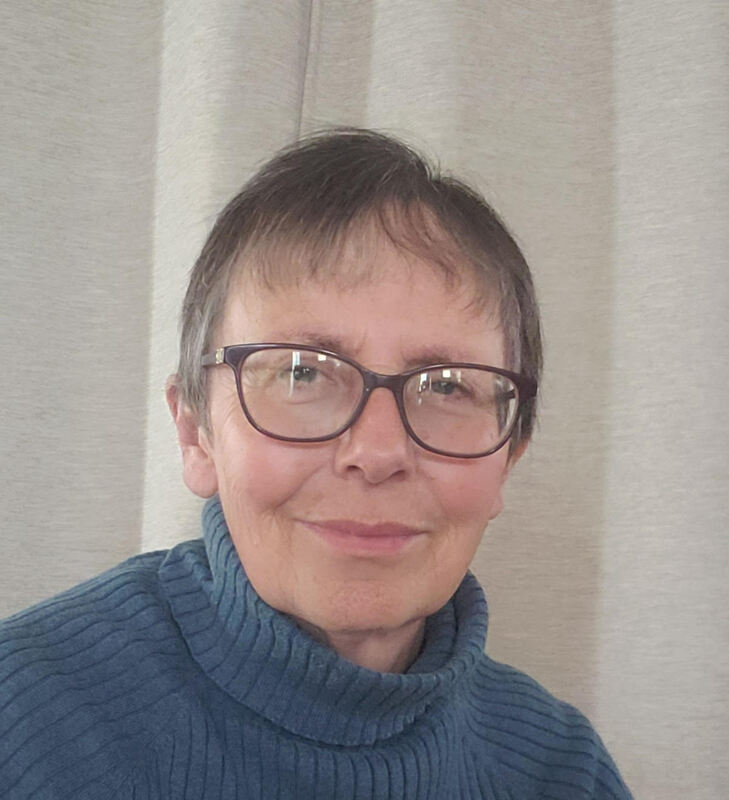
 RSS Feed
RSS Feed
